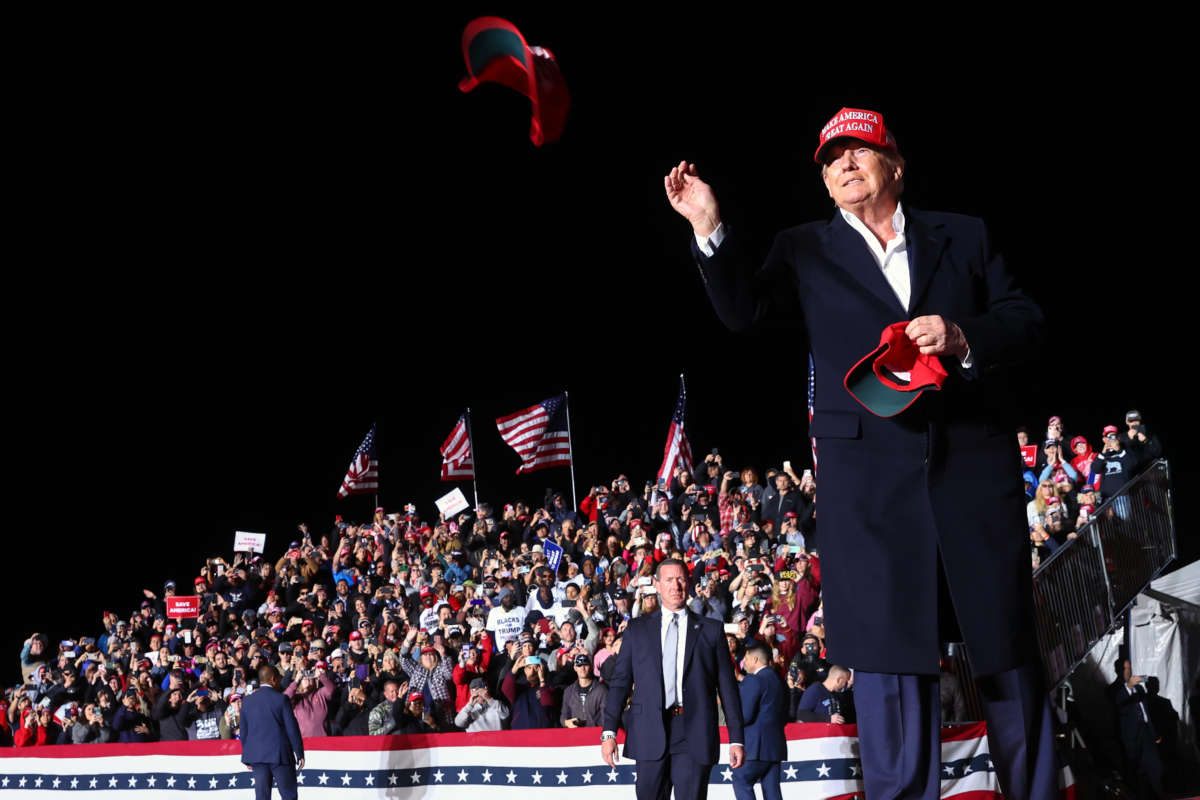Support justice-driven, accurate and transparent news — make a quick donation to Truthout today!
In the final weeks of his tenure, former President Donald Trump asked several of his advisers about pardoning individuals who were involved in the January 6 Capitol attack.
In an article that was published on Wednesday, former advisers to the ex-president spoke to Politico about Trump’s mindset during his final days in office. The advisers were granted anonymity in the article.
One adviser said that Trump asked a variety of questions on issuing a blanket pardon to his loyalists who breached the U.S. Capitol building shortly after the attack.
“Do you think I should pardon them? Do you think it’s a good idea? Do you think I have the power to do it?” Trump asked the advisor.
Another adviser told Politico that Trump asked questions about how individuals who were involved in the Capitol breach might be prosecuted. He also wanted to know if pardoning hundreds of his loyalists could potentially work to his advantage.
“He thought if he could do it, these people would never have to testify or be deposed,” that adviser said.
Other White House advisers pointed out that a blanket pardon might not be appropriate, given that no one had been formally charged for their involvement in the attack at the time. Some, including White House counsel Pat Cipollone, allegedly threatened to leave the administration out of protest if Trump issued the pardons.
The revelation that Trump was thinking about handing out pardons to hundreds of his loyalists after they attacked the Capitol comes days after the former president said he might pardon the Capitol attackers if he is elected president in 2024.
Although he hasn’t yet made a formal campaign announcement, Trump said last Saturday at a rally in Conroe, Texas, that he might pardon his loyalists if he ever reenters the White House as commander in chief.
“So many people have been asking me about it,” Trump said at the rally. “If I run and if I win, we will treat those people from January 6 fairly.”
If that “requires pardons, we will give them pardons,” Trump added.
Members of the House select committee investigating the Capitol attack have suggested that Trump’s comments may have violated the law. Rep. Pete Aguilar (D-California), for example, said that Trump is “absolutely” engaging in witness tampering by encouraging his supporters who are facing charges not to cooperate with the inquiry, and by suggesting that they will be pardoned if he is elected for a second time.
The U.S. Constitution contains very few guidelines, if any, on issuing a presidential pardon, and there isn’t any congressional or judicial oversight on the matter.
Within the first two years of Trump’s presidency, the former president issued 11 pardons and commutations. Meanwhile, current President Joe Biden hasn’t issued a single pardon or commutation since becoming president — and there hasn’t been any indication that he plans to pardon anyone by the end of this year, despite the fact that his administration said that it was evaluating clemency requests last August.
Last fall, the White House vowed to create an equitable pardoning process in the future. But it’s taking too long, says Nkechi Taifa, head of Justice Roundtable, a coalition of more than 100 organizations seeking to reform the federal criminal legal system.
“Their rhetoric says that they understand what we’re saying, and that they’re working on it…If it’s going to take this long for a first step, how long is it going to take for the rest?” Taifa said in December.
A terrifying moment. We appeal for your support.
In the last weeks, we have witnessed an authoritarian assault on communities in Minnesota and across the nation.
The need for truthful, grassroots reporting is urgent at this cataclysmic historical moment. Yet, Trump-aligned billionaires and other allies have taken over many legacy media outlets — the culmination of a decades-long campaign to place control of the narrative into the hands of the political right.
We refuse to let Trump’s blatant propaganda machine go unchecked. Untethered to corporate ownership or advertisers, Truthout remains fearless in our reporting and our determination to use journalism as a tool for justice.
But we need your help just to fund our basic expenses. Over 80 percent of Truthout’s funding comes from small individual donations from our community of readers, and over a third of our total budget is supported by recurring monthly donors.
Truthout has launched a fundraiser, and we have a goal to add 231 new monthly donors in the next 48 hours. Whether you can make a small monthly donation or a larger one-time gift, Truthout only works with your support.
